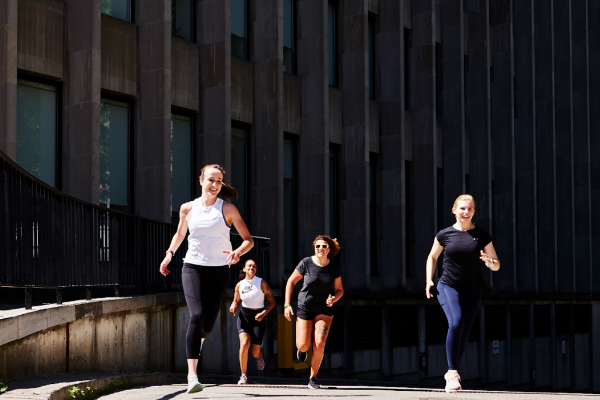There’s something about the new year and the idea of a “fresh start” that most of us find intrinsically appealing. The idea that we can put things that didn’t go well behind us, wipe the slate clean, and begin anew feels liberating; like an organized desk without clutter or junk. Is there anything more satisfying than the feeling of cracking a brand new 2020 Agenda open for the first time and running your hands over the pages representative of 365 days of fresh possibility and hope? For the goal-oriented soul, putting pen to paper for the first time in the year is akin to a slice of heaven.
So why then, do only about 8% of people maintain their resolutions? Where along the line does this optimism wane? And are there ways that we can improve our sticktoitiveness to biohack our lazy brains?
Here’s the thing. Achievements don’t guarantee happiness.
Classic science will tell you the same old tired sentences: People choose unrealistic goals, they don’t realize how long things actually take to see a measurable change, or they don’t have a reliable or consistent way of seeing or sensing changes. But this narrative is old, dry and superficial, and I would argue that the problem is less with the outcome measurement but in the process in which we’re creating our goals in the first place. Take a moment and think about the following things:
- What times or experiences made me feel happy last year?
- What were the circumstances of my best days at work?
- What hobby or interest brought me feelings of positivity or joy?
Note that the answers to these things don’t have to be what one might label an “Achievement”. For example, finishing a marathon may have made you feel happy - great! But what about spending time with your friends at a cottage? Or cooking a really great meal? Or petting your dog? Here’s the thing that’s wrong with traditional goals: Achievements don’t guarantee happiness. And moreover, while they can feel great, they work like a hit of heroin - short-lived and temporary. I’m not saying there’s anything wrong with setting achievement-based goals, but you need to be sure that the process of building towards the achievement intrinsically feels good.
As a brief personal aside, several years ago I was on track to qualify for my pro card in the triathlon world. But the better I got, the more I began to resent training. I wasn’t looking forward to it. I was obsessing over my weight and what I was eating. I was missing out on seeing friends and family. I was racing the best I’d ever raced though, and racking up podiums left right and centre. Of course winning felt good! On the surface, I was the Queen of Achieving, but deep down, I was the unhappiest I’d been in a very long time. And so I quit. Firmly, abruptly, and with a big empty hole that reached deep down inside my soul that wondered who the heck I even would be without being Really Really Good At Triathlon. (The answer? Happy with many, many other parts of life that included training and racing, but in a very different light.)

SMARTER Goals
When making a professional work goal, You might say, “I want a raise at work by August.” Ok, great. Solid goal. More money feels good. But if you’re unhappy at work, feeling unmotivated, bored, or negative, you’re probably not in the right headspace (or environment) to be leveraging your best skills to get that raise. You might be putting in long hours and working hard, but if the energy associated with it is filled with resentment, bitterness, and negativity, inevitably someone else with more passion, positive attitude, and truthfully who’s probably a better candidate will get the raise instead. Alternatively, say you do get that raise. Woohoo! You go to the steakhouse that night and order the most expensive bottle of wine on the menu. And then you go back to your job that you hate the next day, and within weeks, or maybe months if you’re lucky and the raise was fat enough, you start to feel the same old familiar feeling of resentment and negativity. You’re making more money, but day-to-day, you’re not happy, and the money deposits itself in your account and you carry on in the same patterns as you did prior to the raise, but maybe with a little more steak.
So what went wrong? You haven’t identified, or further, you haven’t thought about how your day-to-day emotions are going to play into the goal. And during our lived daily lives, emotions and the information they provide to us are what really and truly matter. I could have (literally) run myself into the ground and gotten my pro card, but I can guarantee you my workouts wouldn’t have become any more enjoyable or my life wouldn’t have felt much better or fun for much longer than a fleeting moment.
By asking yourself, “what were my best days at work like”, you can start to reverse engineer why those days were good. Did you feel empowered? Did you feel challenged? Were you given a temporary new role that resonated with you? Then figure out how to do more of that thing. Maybe this means talking to a superior, or maybe it’s looking for a new job. Do some deep-diving. Think smaller, and build it bigger. Great things are built from small-to-big, not the other way around. Except maybe the Pyramids, but we all know how that worked out for them.
The Sad Runner Stories
I tend to see a lot of (injured) athletes who’s heads can be a little bit buried in the sand. They have often put so much weight into their running career that they have forgotten or lost touch with other things that also enrich their lives. When I tell them they need to take a couple of weeks off to rest their injury, they are very upset by this. Of course it sucks not to run, but it’s worrisome to me when I see that these people feel there is nothing else in their lives that can possibly fill the void of this (temporary!) loss. Does reading make you happy, or another sport or form of exercise? Cooking? Drawing? Identify these other experiences. Give weight to the fact that you love running - that’s amazing! - but also observe and provide non-judgement to the other voices in you that maybe like other activities. Liking reading doesn’t make you lazy. It makes you…someone who likes running and also reading. These other things build happiness, they don’t retract from it. Also, you don’t have to be amazing at them - being good or proficient at something also doesn’t equal happiness. You can simply just do something because it feels good. Watch out for the Being Good At It paradigm. This is merely ego talking. I see so many people post screenshots of how consistent they’ve been with a daily meditation practice. That’s great, but you can also just…meditate without having to be “good at it” or “bad at it”. There’s some real irony in being “good at doing nothing”.
The ultimate problem with setting Achievement-Based goals is that it leaves no room for how the process feels. Break down those goals into actions you can take that feel good, and then see if you still think the goal is a good idea. If you want to run a marathon but you legitimately dislike running for more than 30 minutes, you’re probably going to run out of self-discipline pretty darn quickly. Sure, this means “start smaller”, but the reasoning behind why is much more clear - running for more than 30 minutes just doesn’t feel good to you.
If this resonates with you, other resources I can suggest are:
The Desire Map by Danielle LaPorte
Do Less by Kate Northrup
The Infinite Game by Simon Sinek
The Power of Now by Eckhart Tolle
With health and care,
-Lauren Roberts





